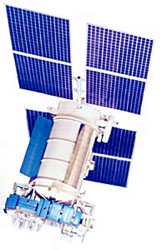|
 Moscow: The Russian developed Glonass navigation satellite system will provide global service from next year, according to Russian premier Vladimir Putin. He made this statement after a Proton rocket put three Glonass satellites in orbit on Monday. Moscow: The Russian developed Glonass navigation satellite system will provide global service from next year, according to Russian premier Vladimir Putin. He made this statement after a Proton rocket put three Glonass satellites in orbit on Monday.
 With this launch, as many as 19 Glonass (Global Navigation Satellite System) satellites will have become operational by the end of this year. With this launch, as many as 19 Glonass (Global Navigation Satellite System) satellites will have become operational by the end of this year.
The system is the Russian equivalent of the US Global Positioning System (GPS), and is designed for both military and civilian use. Like the US GPS, the Russian Glonass allows users to identify their current location and direction. Another three such triple launches are scheduled for next year, with one in February, one in August and one, probably in November. ''We will launch nine satellites, and we will have 24 operational satellites in orbit even if one or two satellites, which are under maintenance, have to be replaced,'' the federal space agency, Roskosmos, director Anatoly Perminov said. ''Our cluster will function like GPS. Twenty-seven out of 30 GPS satellites are working, including two under maintenance.'' Perminov also said that Roskosmos had tied up with foreign partners for the use of the Glonaass system on ''mutually advantageous'' terms. ''We provide Glonass service to our main partners, India and Kazakhstan,'' he said. Similar agreements have been signed with Brazil and Nicaragua, and an agreement with Belarus is almost ready, he said. ''More than 50% of Russian aircraft, vehicles, sea and river vessels were equipped with Glonass receivers in 2009,'' he pointed out. Glonass pilot projects were being implemented in 51 Russian regions. According to declared plans, the Glonass system will deploy 18 satellites for navigation services that will cover the entire territory of the Russian Federation, while 24 satellites would be deployed for global services. India and the Glonass Russia and India signed two cooperation agreements in 2007 during then Russian president Vladimir Putin's visit to the country. Then Russian defence minister Sergei Ivanov also said that New Delhi had agreed to launch Glonass-M satellites with the help of Indian booster rockets, and to create new-generation navigation satellites. According to an earlier December 2005 directive by president Putin, the Glonass system was supposed to be made ready and put into position by 2008. The Glonass programme was technically launched on 12 October 1982, but the formal launch took place only on 24 September 1993. At the beginning of 2007 the Glonass system only had 13 satellites in orbit. There are two versions of the satellites in use - Glonass and its updated version, Glonass-M. This latter has a longer service life of seven years and is equipped with updated antenna feeder systems and an additional navigation frequency for civilian users. A more advanced version, Glonass-K, is an entirely new model based on a non-pressurized platform, standardized to the specifications of the previous models' platform, Express-1000. The estimated service life of the 'K' version has been increased to 10-12 years, and a third "civilian" L-range frequency has been added.
|